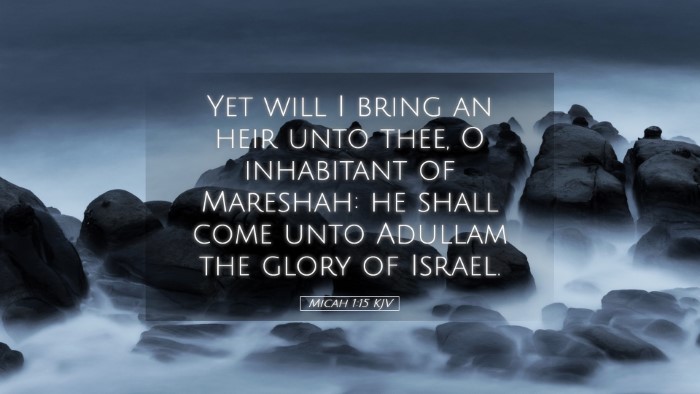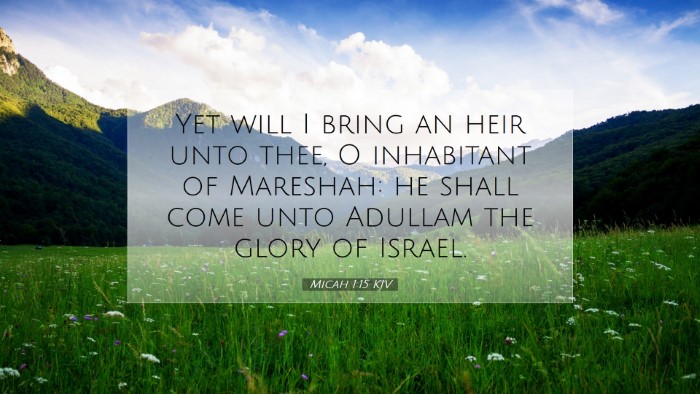Old Testament
Genesis Exodus Leviticus Numbers Deuteronomy Joshua Judges Ruth 1 Samuel 2 Samuel 1 Kings 2 Kings 1 Chronicles 2 Chronicles Ezra Nehemiah Esther Job Psalms Proverbs Ecclesiastes Song of Solomon Isaiah Jeremiah Lamentations Ezekiel Daniel Hosea Joel Amos Obadiah Jonah Micah Nahum Habakkuk Zephaniah Haggai Zechariah MalachiMicah 1:15
Micah 1:15 KJV
Yet will I bring an heir unto thee, O inhabitant of Mareshah: he shall come unto Adullam the glory of Israel.
Micah 1:15 Bible Commentary
Commentary on Micah 1:15
Verse: "Yet will I bring an heir unto thee, O inhabitant of Mareshah: he shall come unto Adullam the glory of Israel." (Micah 1:15)
Overview
The book of Micah is a profound prophetic text grappling with themes of judgment and hope. Micah 1:15 serves as a poignant declaration of God’s impending judgment on the inhabitants of Judah, while simultaneously hinting at a future restoration and promise of deliverance. This verse hits at the heart of prophetic literature, exposing both the severity of sin and the enduring mercy of God.
Contextual Framework
Micah prophesied during a turbulent period in Israel’s history, amid idolatry, injustice, and societal corruption. His messages often combine warnings of coming judgment with assurances of God's commitment to His people. Within this context, Micah 1:15 takes on significant meaning, indicating the impending desolation of cities like Mareshah while also whispering of hope through the notion of an "heir."
Exegesis of Key Terms
- Mareshah: A city in Judah, often associated with rural life and agriculture, its mention signifies the reach of God’s judgment even into the smaller community settings.
- heir: This term points towards inheritance and continuation. It suggests that even amidst judgment, God intends to sustain a remnant and has plans for their future.
- Adullam: A significant location, known as the cave where David fled from Saul, symbolizing refuge and hope—an essential theme in Micah's prophecy.
- glory of Israel: This phrase invokes the presence and favor of God among His people, emphasizing that despite pending judgment, the essence of glory remains tied to adherence to God’s covenant.
Theological Implications
The promise in Micah 1:15 reflects God's sovereignty over history. It indicates that no matter the depth of human failure, God’s plan for redemption persists. This resonates strongly within the theological discourse around God’s covenant community and His unyielding commitment to His people.
Commentary Insights
Theological scholars and commentators have offered rich insights into this verse:
- Matthew Henry: Henry elucidates the duality of divine judgment and grace, illustrating that God's punishment, while severe, serves to bring about redemption. He stresses that God's grace will not abandon His people even when they face dire consequences for their sins.
- Albert Barnes: Barnes highlights how this verse encapsulates both the destruction awaiting the people of Judah and the promise of an heir who will emerge from among them to bring hope. He reflects on the irony that judgment can lead to a future inheritance.
- Adam Clarke: Clarke offers a detailed linguistic and cultural analysis of the terms used, noting that God's promise to bring an "heir" even from a state of desolation points to the messianic hope embedded within the prophetic texts. He emphasizes that this restoration is reflective of God’s ultimate purpose for His creation.
Practical Application
For pastors, students, and theologians, Micah 1:15 invites several practical reflections:
- Hope Amidst Judgment: The presence of hope in judgment encourages believers to remain steadfast in faith, even in trying times, knowing that God's plans transcend immediate circumstances.
- Faithfulness to God’s Promises: A reminder of God's faithfulness can inspire contemporary believers to trust in divine providence, reflecting on how this historical truth applies to modern contexts.
- Understanding Covenant Relationships: The verse encourages a deeper study on the nature of God’s covenant with His people — underscoring how accountability, relationship, and mercy interplay in the life of faith.
Conclusion
Micah 1:15 serves as a microcosm of the broader messages found throughout the prophetic literature. It highlights themes of judgment and hope, prompting deeper inquiry into God’s unwavering faithfulness. For scholars and practitioners alike, this verse challenges readers to recognize the fullness of God’s character — just, yet merciful, and working through history to fulfill His redemptive purposes.


